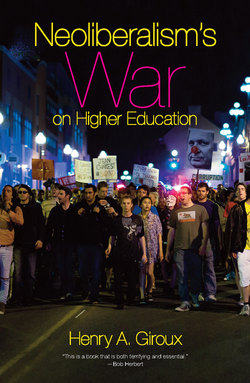Neoliberalism's War on Higher Education

Реклама. ООО «ЛитРес», ИНН: 7719571260.
Оглавление
Henry A. Giroux. Neoliberalism's War on Higher Education
Contents
Отрывок из книги
For Wendy Simon
To those brave and committed teachers who are struggling to educate young people for a more just and democratic world
.....
Gilded Age vengeance has also returned in the form of scorn for those who are either failed consumers or do not live up to the image of the United States as a white Christian nation. Reality TV’s overarching theme, echoing Hobbes’s “war of all against all,” brings home the lesson that punishment is the norm and reward the exception. Unfortunately, it no longer mimics reality, it is the new reality. There is more at work here than a flight from social responsibility. Also lost is the importance of those social bonds, modes of collective reasoning, and public spheres and cultural apparatuses crucial to the construction of the social state and the formation of a sustainable democratic society. Nowhere is the dismantling of the social state and the transformation of the state into a punishing machine more evident than in the recent attacks on youth, labor rights, and higher education being waged by Republican governors in a number of key states such as Michigan, Wisconsin, Florida, and Ohio.
What is often missed in discussions of these attacks is that the war on the social state and the war on education represent part of the same agenda of destruction and violence. The first war is being waged for the complete control by the rich and powerful of all modes of wealth and income while the second war is conducted on the ideological front and represents a battle over the very capacity of young people and others to imagine a different and more critical mode of subjectivity and alternative mode of politics. If the first war is on the diverse and myriad terrain of political economy the second is being waged though what C. Wright Mills once called the major cultural apparatuses, including public and higher education. This is a struggle to shape indentities, desires, and modes of subjectivity in accordance with market values, needs, and relations. Both of these wars register as part of a larger effort to destroy any vestige of a democratic imaginary, and to relegate the value of the ethical responsibility and the social question to the wasteland of political thought. Paul Krugman is on target in arguing that in spite of massive suffering caused by the economic recession—a recession that produced “once-unthinkable levels of economic distress”—there is “growing evidence that our governing elite just doesn’t care.”47 Of course, Krugman is not suggesting that if the corporate and financial elite cared the predatory nature of capitalism would be transformed. Rather, he is suggesting that economic Darwinism leaves no room for compassion or ethical considerations, which makes its use of power much worse than more liberal models of a market-based society.
.....